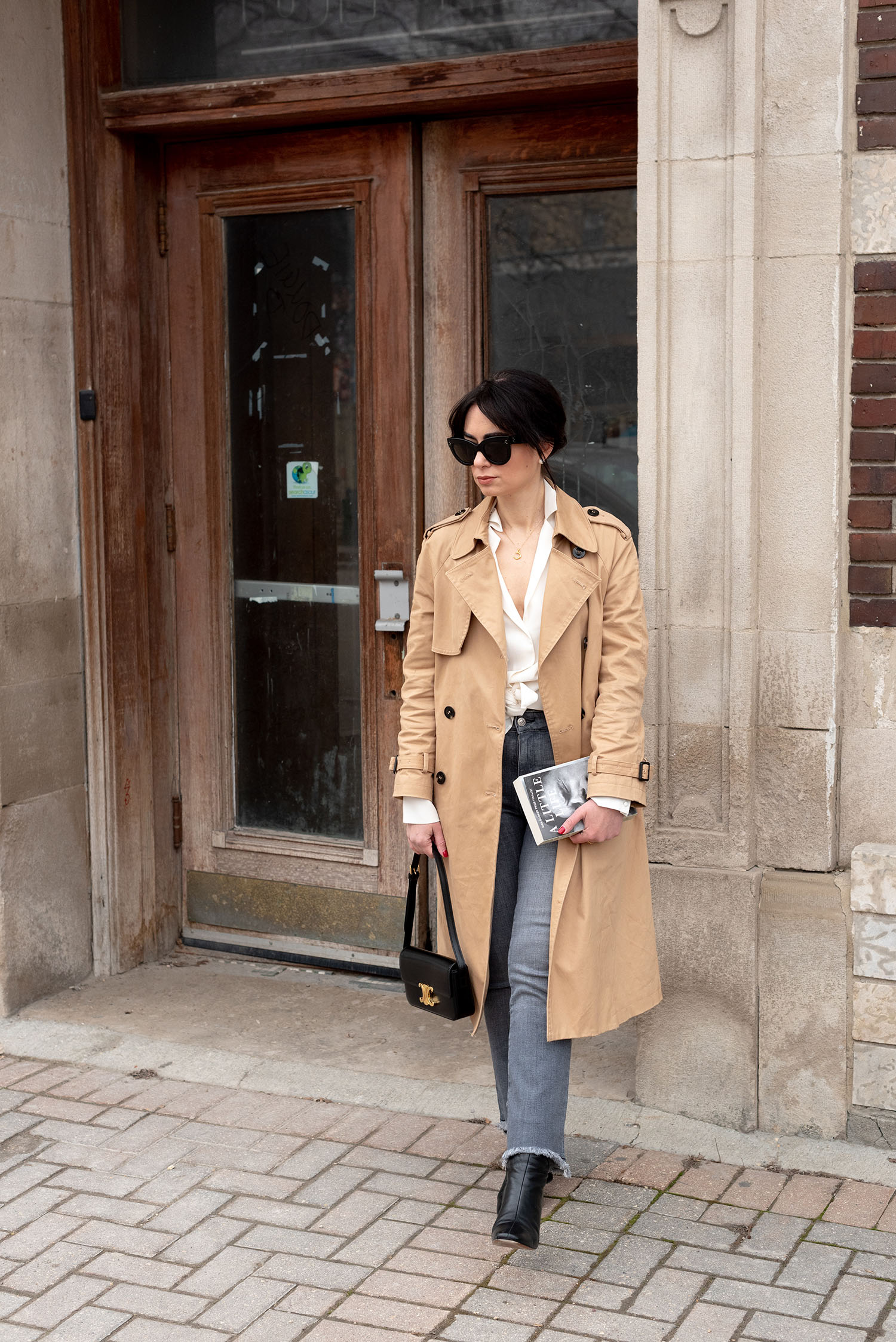
Sezane shirt
Mavi jeans (c/o)
Rouje boots (similar)
Celine handbag
Celine sunglasses
Linjer rings (c/o) (similar)
Celine necklace (similar)
Maris Pearl Co. earrings (c/o) (similar)
Location: Osborne Village – Winnipeg, Manitoba
Book: A Little Life – Hanya Yanagihara
A Little Life should come with a trigger warning printed on a page before the start of the story.
I wanted to love this book. There’s so much about it to love, in theory. It’s author is female, and although the protagonists are all men, nothing about their experiences rings false or hollow. The female author in question is a fashion editor who effectively proves literature is not the exclusive domain of good writing. And that to dismiss anyone’s ability to do anything based on their line of work is a grave error in judgement. Hanya Yanagihara is a late bloomer, in a way, although she was already extremely successful. She got a belated start as an author, but debuted the way most writers can only hope to – with such an achievement that no one could deny her gifts (even if her first book did only sell a few thousand copies.)
And yet… A Little Life was a long, hard read. The protagonist, Jude, is a victim of abuse at the hands of dozens of people, the full extent of which is revealed as the (very lengthy) story progresses. Moreover, he is a victim of abuse who refuses all help, for a variety of reasons that are legitimate and common but nonetheless leave him trapped in a cycle of self-flagellation, self-loathing and self-harm, unable to recognise, except in rare moments, how absolutely loved he is by everyone around him. They love him, anyway, sometimes to the point of distraction. Yanagihara does an impeccable job of making this as painful to read about as it would be to experience in real life. There are moments of happiness in A Little Life, but even these are tinged with the sad knowledge of what has happened, and what is still to come.
If you’ve ever lived through abuse yourself, you’re likely to recognise yourself in Jude. For some, that may offer a bit of reassurance, a little proof that none of us are alone. That wasn’t the case for me. For me, reading A Little Life was taking a terrible trip back in time. On that journey, I revisited feelings I’d hoped I’d never be compelled to recall. Around page six-hundred, I had to put it away for a few days. Not just close it, but put it in a drawer, out of sight, to avoid the temptation to pick it up and make things worse. The fact that the book is so affecting speaks to Yanagihara’s skill as a writer. There’s a reason it was shortlisted for so many awards, including the Man Booker Prize.
A personal note: When I first conceived the idea of Coco & Voltaire, I planned to write almost exclusively about books I loved. I’m a writer. Which means that I understand, fundamentally, that most books are neither good nor bad as long as the right person is reading them. There is an audience for almost every subject and style. But sometimes, it’s just not that simple. Some books, while wonderful in every way that seems to matter, are still very difficult to enjoy. That does not make them less worthy of recognition for what their authors have done so well.
Hanya Yanagihara did everything right with A Little Life. But readers should tread carefully around it. Not all books are meant to be widely read. This one proved entirely too much for me. I finished it, but just – and mostly to say I did. I struggle to think of anyone who would move through it easily and close it feeling satisfied. A number of reviewers, including Jeff Chu at Vox, wrote that while the book was among the most profoundly moving they’ve ever picked up, they would never recommend it to anyone. I won’t go quite that far. Yanagihara is exceptionally perceptive. The way that she can see inside the lived experience of so many people and articulate it with such depth of feeling while completely avoiding value judgements is astonishing to witness. The kind of prose she writes is so worthy of reading.
…but it’s also so very hard to read. If the experience of abuse is unfamiliar to you, A Little Life offers a window into a different world. It will leave you, I’m sure, with an entirely new understanding of what victims live through. (For this reason alone, it should probably be required reading for psychology and social work students.) But if you’re struggling, or ever have struggled, through the aftermath of abuse, I will tell you plainly that picking up this book isn’t worth the risk to your own sanity.